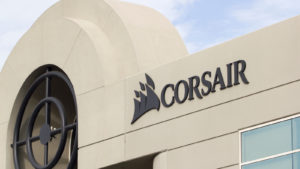Sell these video game stocks amid industry challenges that could lead to losses
The video game industry, while robust, faces serious challenges. Slowing consumer spending, market saturation, and less-than-appealing video game titles are weakening the industry's position. Moreover, while video games are one of the fastest-growing segments of entertainment, they are not immune to market saturation and fierce competition. Therefore, it may be time to think about the right video game stocks to sell.
Recent data shows a worrying trend with U.S. video game sales falling 3% year over year to $4.1 billion in April. The decline was primarily driven by hardware sales, which fell 43% to $208 million. Meanwhile, video game content sales increased just 2% to $3.74 billion. The gaming hardware sector as a whole is down at least 26% year over year. In light of these worrying statistics, here are three video game stocks to sell now.
GameStop (GME)

Source: 1take1shot / Shutterstock.com
GameStop (New York Stock Exchange:globalInvestors in the stock are reeling from seeing its market capitalization drop by more than $6.4 billion since the peak of the recent meme-stock rally, which saw shares of GME surge along with other meme stocks, fueled by the re-emergence of social media influencer “Roaring Kitty.”
But the momentary buzz around GME stock has done little to hide the underlying problems in the company's business. Online gaming sales have been growing at a staggering pace, outpacing sales growth at brick-and-mortar stores. GameStop has been trying to reinvent its business to align with industry trends, but so far its efforts have not borne much fruit.
As a result, the change in earnings is firmly negative at -11%, below the five-year average loss of -7%. Thus, the outlook remains very bleak, with social media hype being the only lifeline. Therefore, serious investors should avoid GME stock at all costs to reduce downside risks.
Electronic Arts (EA)

Image credit: ricochet64 / Shutterstock
Electronic Arts (Nasdaq:EA) is a popular video game publisher known for an array of classic titles that have garnered a huge fanbase. Despite years of stable operations, the company is now venturing into uncharted territory. The transition from legacy titles to new endeavors raises serious questions about the company's future growth trajectory.
While popular franchises like EA Sports FC (formerly FIFA) and Apex Legends remain profitable, their aging appeal has created a need for new intellectual property. The move to EA Sports FC in particular creates long-term uncertainty if FIFA lines up with a new partner.
Meanwhile, EA investors are facing a hit from the company's testing transition phase. In its fourth-quarter report, the company reported revenue of $1.67 billion, down about 14.4% year over year and beating expectations by $104.9 million. Furthermore, a lackluster outlook for fiscal 2025 and broader market challenges will likely make the stock a drag on shareholder value in the near term.
Corsair Gaming (CRSR)

Source: Tada Images/ShutterStock.com
Corsair Gaming (Nasdaq:About CRSR) is a leading player in the gaming and streaming components industry. It enjoys a strong niche market position, has a relatively stable business and has posted healthy revenue growth, although recent market headwinds have caused a notable slowdown in its performance.
The company recently reported first-quarter results showing revenues down 4.7% year over year to $337.3 million, missing expectations by $25.5 million — a quarter that fell well below expectations on both fronts. Additionally, first-quarter earnings per share were 9 cents, missing expectations by 5 cents.
Going forward, Corsair will be heavily reliant on the success of its peripheral sales and upcoming product launches for the remainder of the year. Although the company's management has offered optimistic guidance for the company's performance at the end of the year, that outlook does not seem to be in line with current trends. Furthermore, the intense competition in the space means Corsair stock investors stand to lose more.
As of the date of publication, Muslim Farooq did not hold (either directly or indirectly) any positions in the securities mentioned in this article. The opinions expressed in this article are those of the author in accordance with InvestorPlace.com's Publishing Guidelines.


